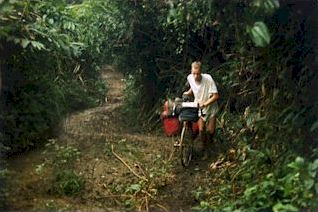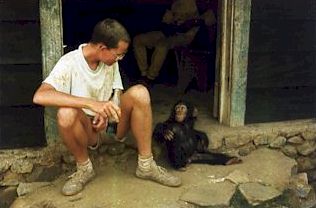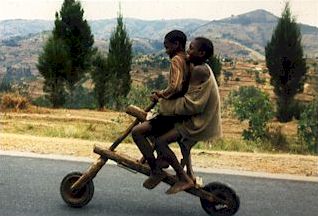Since our link-up at Kisangani, Jens and I are
traveling along a tarred road that is being plodded deeper and deeper into
the swampy jungle, with it's extreme conditions by a German construction company.
It's impeccable surface and the German road signs that announce the next village
in the familiar black wrighting on yellow background have a somewhat surreal
effect. But the fact that we share this road only with the construction vehicles
also has us wondering whom this road is being built for, exactly. The only
vehicle an average Zairian jungle inhabitant owns, next to the odd bicycle,
being the skillfully crafted
 |
After a full day of struggling through the 40 kms of jungle, we stand tired and disbelieving at the start of yet another brand-new stretch of asphalt road, appearing out of the blue, and ending in similar fashion: a contribution of international aid from the Chinese.
In a major Hospital, where we even meet German Doctors, AIDS awareness placards are everywhere, while used needles and other medical equipment is neatly kept in a jar awaiting their next use. Meanwhile, in the forests, millions are being spent on roads that will never be completed. Do these projects really uplift the standard of living for the local people, as they proclaim, or are they merely serving first world economies?
Before we reach the 2 600 meter mark on the
 |
The climate changes immediately, becoming cooler and drier. I often find myself crawling into my warm sleeping bag at night, a comforting, almost forgotten feeling. Here, in the mountains along Lake Civu, on the border to Rwanda, live the last remaining mountain gorillas. The astronomically high entrance fee of 100 US Dollars, keep us from catching a glance of them. Instead we become acquainted with a little chimpanzee who robs us of a couple of avocados, which he then washes down with a Fanta, which he had also relieved us of. After the past few exhausting and hunger stricken weeks, we are invited by a plantation and pharmaceutical factory owner in Bukavu, a German, producing Chinin, for the fight against Malaria. The amazing view from his house over the waters of Lake Civu and the last mountains of Zaire remind me of the Geneva Lake rather than Africa. We enter the lake however only from the jetty, as its bottom, like many African lakes, holds hidden dangers in the form of snails which carry and transmit Bilharzias, a life threatening worm infection.
Zaire and the Sahara have surely been the most challenging stages this journey had to offer. Whilst I have fond memories of the warmhearted desert inhabitants, I am left with not many good memories of Zairian ties. Most relations originate out of financial interests rather than personal ones. Corruption is not an exception but a regular occurrence. Most of all the thought of my missing luggage brings about feelings of relief when we finally exit Zaire after 6 weeks.
 |
Rwanda, , the "land of a thousand hills" is quite a challenge for a cyclist, sceneries constantly alternating between steep ascending slopes and comparable descents. When seen on the map these advances represent movements, of not more than a few millimeters. The roads here are easily comparable to European ones and somehow this seems to motivate bus drivers to attempt near-death overtaking maneuvers. The hoards of little children that appear from each hut that we pass and that follow us with deafening cheers becomes a bit of an annoyance after a while. But then again, we are "Musungu", on a bicycle of all things, so it comes as no surprise that we are regarded as aliens in these regions. ("Musungu" = "white man" in the east African Suahili language). Kigali is a green, quiet, surprisingly well functioning Capital. The organization of airport customs gives us a pretty good insight into the African fine art of postponement however.
To get hold of the urgently needed spare parts my mother had sent to Kigali from Bad-Soden, we spend 3 hours collecting signatures from 15 different offices, making copies upon copies and organizing carbon paper, which here, the receiver is responsible for. And when the overworked officials finally hand me my parcel, just minutes before closing, it is thanks to the involvement and written reference of the Embassy's secretary, whom we are staying with. Before making our way along Lake Victoria to the neighboring Uganda, we visit the broadcast station of the "Deutsche Welle" in Kigali that transmits local news around the world, and it is through the "Deutsche Welle" that we receive confirmation of a civil war in Rwanda, just hours after our departure.
The borders have since been shut down, would we have tried to cross them 1 day later we might have been trapped. Like so many African wars, so too, does this one have its origins in the ancient rivalries between ethnic groups. The troops that we had passed on Ugandan roads were exiled Rwandans who, after 30 years, are trying to force their way back into their country where they are not wanted. On 3 October we are invited to a reception at the German Embassy in the Ugandan capital Kampala to share in the celebrations of the German reunification. Celebrating this in a country that is trying to recover from the damages implied by 2 consecutive dictatorships, and from which rebel troops have just set out to fight a war on neighboring grounds, feels a bit bizarre, to say the least. What a contrast! Hardly anywhere in Africa can one speak of a joint nation.
To download page Beginning of page Next page